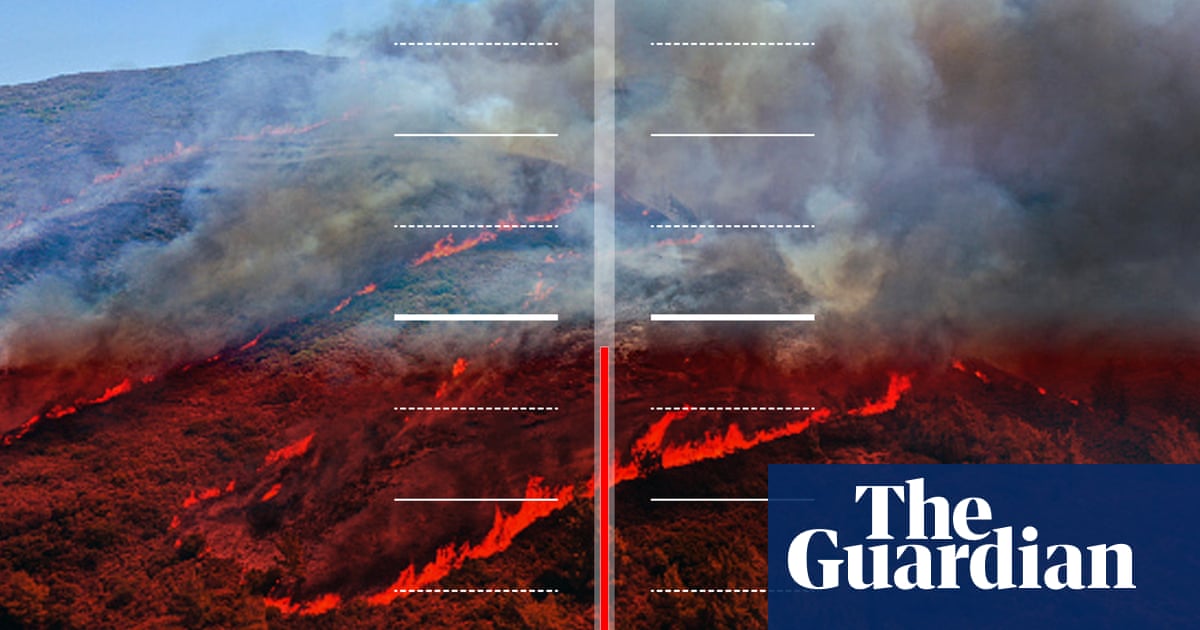
In his Cop27 speech this week, our will-he-go, won’t-he-go prime minister said that stopping the planet dangerously overheating was still within our grasp, leaving many wondering just what planet he was on.
According to Rishi Sunak, last year’s Cop26 climate conference in Glasgow was all about keeping alive the possibility of preventing the global average temperature rise since the Industrial Revolution from climbing above 1.5C. That is “alive”, as in connected to a drip, in a coma and suffering cardiac arrest every few hours.
One year on, the picture is even bleaker. Over the course of the past 12 months, while the UK has held the Cop presidency, only 24 nations tightened plans (known as NDCs – nationally determined commitments) to cut their own emissions, while global carbon output continued to climb remorselessly. Now, surely, the goal of 1.5C must be on life support, just awaiting someone to flick the switch and wheel it off to the morgue.
I write this in my recent book, Hothouse Earth: An Inhabitant’s Guide, and in the run-up to Cop27, the UN Environment Programme suggested the same when it announced that there was no longer any credible pathway to achieving the 1.5C target. But still, voices can be heard at Cop27 claiming that this is achievable – including that of the former British prime minister Boris Johnson. In theory, this is correct, in the same way that someone tied to railway tracks in front of a speeding express train can, in theory, save themselves. Both are delusional.
In 2015, at Cop21 in Paris governments agreed to pursue efforts to limit the global average temperature rise to 1.5C. To say that progress made since has proceeded at a snail’s pace would be an insult to molluscs. Instead, we are in a position whereby, to achieve this, emissions would need to fall 45% in the next seven and a bit years – when they are actually on track to rise by 10%, compared with 2010 levels. Seven years ago, the 1.5C target seemed a sensible one. Now, it is at best, irrelevant, and at worst, dangerous. It has to go.
Continuing to argue for the viability of 1.5C is misleading and raises false hopes. As such, it is vital that Cop27 squashes claims that the goal is still alive. Not only this, it needs to hold up its hands and acknowledge the fact that missing this critical target represents a colossal failure for the whole Cop apparatus.
In retrospect, it is clear that having a specific target, rather than fighting to stop every fraction of a degree in temperature rise, has actually been counterproductive. There is a perennial problem with targets, and that is that they are always still reachable – until they aren’t. In this way, they can be used to justify inertia right up until it is too late. And this is exactly how fossil-fuel corporations, world leaders and others have used 1.5C – as a get-out-of-jail card to justify inaction on emissions. Continuing to present this temperature threshold as an attainable target provides a fig leaf for business as usual. Take it away, and this dangerous jiggery-pokery is exposed for all to see.
Only if Cop acknowledges that 1.5C is now lost, and that dangerous, all-pervasive climate breakdown is unavoidable, will corporations and governments no longer have anywhere to hide, and no safety net that they can use as an excuse to do little or nothing. Only if they finally lay bare the bankruptcy of efforts to achieve the goals of Cop21 will we be able to move on to acknowledging that every 0.1C temperature rise needs fighting for.
We also have to accept that we are going to crash through the 1.5C climate breakdown guardrail, so that we are forced to face the brutal reality of desperately challenging climate conditions in the decades to come. This means facing the fact that we have no choice but to adapt rapidly to a very different world, one that our grandparents would struggle to recognise.
The failure of the Cop process to avert the arrival of Hothouse Earth conditions doesn’t mean that it’s all over, that the battle is lost. Far from it. Above and beyond 1.5C, each and every 0.1C rise in global average temperature that we can forestall becomes critical; every ton of carbon dioxide or methane we can prevent being emitted becomes a vital win. Knowing that the world we are leaving to our kids and their kids is certain to be grim, we should be motivated to do everything in our power to ensure that we don’t hurtle past the 2C marker, too, allowing global heating to continue until wholesale climate mayhem becomes unavoidable.
As for 1.5C, we may well get a taste of what is in store for us in the next year or two. Over the past five years, the average global temperature rise – compared with 1850-1900, which is often used as a benchmark for the pre-industrial period – was a shade under 1.3C. Despite La Niña conditions – which typically bring cooler temperatures – prevailing in the tropical Pacific in 2022, it is likely that this year will still prove to be one of the warmest on record. If La Niña gives way to hotter, so-called El Niño, conditions – as it often does – either later next year or in 2024, we may well see an increase in global temperatures so that the 1.5C mark will be threatened or even matched.
One would hope that, even if it is temporary, hitting this fateful milestone will at last galvanise the action on emissions that is needed to stop a perilous future becoming a cataclysmic one.
Bill McGuire is professor emeritus of geophysical and climate hazards at UCL and the author of Hothouse Earth: An Inhabitant’s Guide












